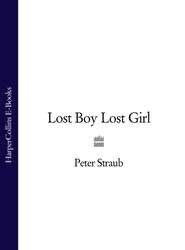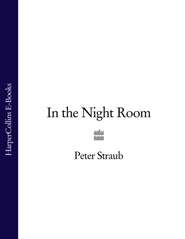По всем вопросам обращайтесь на: info@litportal.ru
(©) 2003-2024.
✖
Mr. X
Настройки чтения
Размер шрифта
Высота строк
Поля
I hope …
Lots o love,
Star
I knew that her wishes weren’t for a happy birthday but an untroubled one, which would have been happiness enough. A half second after this insight opened the door, the first adult recognition of my life slammed into me, and I saw that my mother slighted my birthdays because she blamed herself for what befell me then. She thought I got it from her; she could not bear to think about my birthdays because they made her feel guilty, and guilt was the emotion free spirits like Star could least handle.
The sound of Gene Ammons playing ‘It Might as Well Be Spring’ soared out of the speakers and passed straight into the center of my body.
In khaki shorts and polo shirts, the Grants were monitoring the progress of herbs and vegetables in their garden. In the moment before they noticed me, I experienced the first in about a month of those What’s wrong with this picture? moments, an animal awareness of my incongruity in this sweet suburban landscape. Danger; shame; isolation: exposure. Me and my shadow, there we were. Laura turned her head, and the bad feeling vanished even before her face warmed and somehow deepened, as if she knew everything going on inside me.
‘Action Jackson,’ Phil said.
Laura glanced at the card, then back into my eyes. ‘Star could never forget your birthday. Can I see it?’
Both Grants liked my mother, though they liked her in different ways. When Star came to Naperville, Phil turned on an old-fashioned courtliness he thought was suave but Laura and I found hilarious, and Laura made room to talk by going out with her for an hour’s shopping. I think she usually slipped her fifty or sixty bucks, too.
Laura smiled at the elegant white house and birthday-party froufrou on the front of the card and looked up at me. The second grown-up recognition of my life flew between us like a spark. Star had chosen this card for a reason. Laura did not evade the issue. ‘Wouldn’t it be nice if we had dormer windows and a wraparound porch? If I lived in a place like that, I’d impress myself.’
Phil moved closer, and she opened the card. Her eyebrows contracted as she read the message. ‘“I hope …”’
‘I hope for that, too,’ I said.
‘Of course you do,’ she said, getting it.
Phil squeezed my shoulder, getting into executive mode. He was a products manager at 3M. ‘I don’t care what these clowns say, it’s a physical problem. Once we find the right doctor, we’re going to lick that thing.’
‘These clowns’ were my pediatrician, the Grants’ GP, and the half dozen specialists who had failed to diagnose my condition. The specialists had concluded that my problem was ‘not of organic origin,’ another way of saying that it was all in my head.
‘Do you think I got it from her?’ I asked Laura.
‘I don’t think you got it from anybody,’ Laura said. ‘But if you’re asking me does she feel terrible about it, sure she does.’
‘Star?’ Phil said. ‘Star would have to be nuts to blame herself.’
Laura was watching to see how much I understood. ‘Mothers want to take on anything that could hurt their kids, even the things they can’t do anything about. What happens to you makes me feel terrible, and I can’t even imagine what it does to Star. At least I get to see you every day. If I were your real mother, and my only chance to end world hunger for the next thousand years meant I had to go out of town on your birthday, I’d still feel awful about letting you down. I’d feel awful anyway, real mother or not.’
‘Like you weren’t doing the right thing,’ I said.
‘Your mother loves you so much that sometimes she can’t stand not being Betty Crocker.’
The idea of Star Dunstan being anything like Betty Crocker made me laugh out loud.
Laura said, ‘Doing the right thing doesn’t always make you feel good, no matter what anybody says. Doing the right thing can hurt like the dickens! If you want my opinion, you have a great mom.’
I would have laughed again, this time at her Girl Scout’s notion of cursing, but my eyes stung and a thick obstruction filled my throat. A little while ago, I said that two days after my fifteenth birthday I came to understand my mother’s feelings in a way I could use, and this is what I meant. I learned to ask questions about the things that scare you; that doing right could make you hurt too bad to think straight; that once you are you that’s who you are, and you have to pay the price.
2 Mr X (#ulink_a2a81151-b361-5514-95e6-0e1a5173063d)
O Great Old Ones, read these words inscribed within this stout Journal by the hand of Your Devoted Servant and rejoice!
I always liked walking late at night. In a comfortable city like Edgerton, the enormous blanket of darkness cushions even the sound of your footsteps on the pavement. I walk down the avenues, past the empty department stores and movie theaters. I drift down Hatchtown’s narrow lanes and look up at shuttered windows I could pass through in a second, but do not: part of my happiness is in the weighing and measuring of the lives about me. And like anyone else, I enjoy getting out of the house, escaping the captivity of that sty to which I am self-condemned. During my rambles I avoid street lamps, though regardless of the season I am dressed in a black coat and hat – a moving shadow, invisible in the darkness.
Or: nearly invisible. Invisible to all but a deeply unfortunate few, many of whom I admit to killing less from the need to protect myself than out of … pique, maybe, or whimsy. There was one exception.
I subtracted from the world the gangly hooker in stacked, high-heel sandals and a skirt the size of a washcloth who launched herself toward me from a Chester Street doorway, so high on whatever girls were doing for fun that year that she grabbed my elbow to keep from swaying. I looked at the pinpoint dots of her pupils and let her pull me toward the doorway, opened her up like a can of sardines, and broke her neck before she remembered to scream.
I gave more or less the same treatment to the kid wearing a black sweatshirt and fatigue pants who saw me because he thought he was looking for someone like me, surprise, surprise, and the young woman with a black eye and swollen lips who wavered out of a parked car at the sound of my footsteps and tried to get back into the car once she saw me, but it was too late, poor baby. And let us not forget the actual baby I found abandoned atop a Dumpster and assisted in its departure from an inhospitable world by detaching its darling little hands and excising its little outraged eyes.
The baby had not seen me, true. I believe that requires an especially heightened degree of sorrow or misery, loss so irreparable as to make the rest of life an eternal wound, and the baby was merely cold and hungry. But long ago, an untimely arrest and imprisonment kept me from doing the same to another newborn, and anger got the better of me. I never claimed to be perfect.
The noisome, Night Train-reeking dwarf I killed to protect myself had pulled himself upright between the garbage cans in the alley alongside Merchants Hotel and gaped at my approach. All but a few of his ilk fail to see me even when they are looking directly at me, and those few have the sense to back away. This fellow was still too foggy for sense. A ragged shaft of star-shine caught his eye. ‘Root-toot-toot, fuckin’ Dracula,’ he said. He giggled and leaned shakily over the garbage cans to inspect the grubby cement. ‘Hey, where’d Piney go to? You seen Piney, Drac?’ He referred to a more functional version of himself, a shabby outcast of whose existence I had long been vaguely aware.
‘Rooty-tooty,’ said the wretch, who would have gone on destroying himself without my assistance had he not followed his mantra by suddenly peering at me with a hideous mixture of delight and confusion and saying, ‘Hey, man, talk about long time no see. I thought I heard … I thought you was … aah …’
He was one Erwin ‘Pipey’ Leake, some thirty years previous a hard-drinking young English instructor at Albertus University and a hanger-on of my bohemian period.
‘Is Star … Star Dunstan, isn’t she …’
I gripped his throat and slammed his head against the bricks. He tugged at my wrist, and I clamped my free hand over his face and twice more drove his head against the wall. The eyes of the former acolyte floated upward, and a stench of dead fish came from his mouth. When I let go, he crumpled between the garbage cans. I smashed my boot onto his head, heard his skull crack, and kept stamping until the side of his head turned soft.
These idiots should know enough to keep their mouths shut.
Great Beings, You who in aeons to come shall linger over these words penned by Your Devoted Servant, You alone comprehend my certainty that a great change is in the air. The culmination of that Sacred Mission entrusted to me and so teasingly adumbrated by the Providence Master has begun to declare its appearance upon the earthly stage. As I walk unseen through the city, the flow of information sharpens and intensifies, bringing with it the promise of that destiny for which I have waited since I was a boy taking lessons from the foxes and owls in Johnson’s Woods.
Here, in a room stacked with microwave ovens and laptop computers, a professional thief and occasional arsonist named Anton ‘Frenchy’ La Chapelle lies unconscious in sleeping embrace with one Cassandra ‘Cassie’ Little, a hard-bitten little scrubber. Hello, Frenchy, you delightfully nasty piece of work! You don’t know it, but I imagine that your pointless life is going to serve some purpose after all.
Here, on the second floor of a rooming house, Otto Bremen, a grade-school crossing guard, slumbers before his television screen with a not quite empty bottle of bourbon nestled in his crotch. The last half inch of a cigarette burns inexorably toward the first two fingers of his right hand. The conjunction of the cigarette and Frenchy’s secondary occupation suggests a possibility, but many things are possible, Otto, and whether or not you are to die in a fire – as I rather think you are – I wish, with the puppet-master’s fondness for his insensate and pliable creatures, that you might know a minute portion of the triumph rushing toward me.
For in my city’s secret corners I already see runners of the blue fire. It hovers over Frenchy and his partner, it travels down the crossing guard’s arm, and it gathers itself for an electrifying moment along the rain gutters on Cherry Street, where the surviving Dunstans eke out their blasted lives. Enormous forces have begun to come into play. Around our tiny illuminated platform suspended in the cosmic darkness, the ancient Gods, my true ancestors, congregate with rustlings of leathery wings and rattlings of filthy claws to witness what their great-grandson shall accomplish.
A most marvelous event has taken place. Star Dunstan has come home to die.
Can you hear me, slug-spittle?
Listen to me, you exhausted bag of skin –
My dearest hope is that your flesh should blister, that you should have to labor for the smallest gulps of air and feel individual organs explode within you, so on and so forth, your eyes to burst, that kind of thing, but though I shall not be able to manage these matters on your behalf, my old sweetheart, I shall do my best to arrange them for our son.
3 (#ulink_8eb99c89-8aa2-5fd8-8905-90ebe29db866)
Right from the beginning, I had the sense that something crucially significant, something without which I could never be whole, was missing. When I was seven, my mother told me that as soon as I’d learned to sit up by myself, I used to do this funny thing where I turned around and tried to look behind me. Boom, down I’d go, but the second I hit the ground I’d turn my head to check that same spot. According to Star, Aunt Nettie said, ‘That boy must think the doctor cut off his tail when he was born.’ Uncle Clark chimed in with, ‘He appears to think someone’s sneakin’ up on him.’
‘They meant you had something wrong with you,’ Star told me, ‘which was to be expected, me being your mother. I said, “My boy Neddie’s smart as a whip, and he’s seeing if his shadow followed him inside the house.” They shut up, because that was exactly how you looked – like you were trying to find your shadow.’
I can scarcely describe the combination of relief and uncertainty this caused in me. Star had given me proof that my sense of loss was real, for it had been a part of me long before I could have made it up. Even before I could walk, back when my thoughts could have been little more than the recognition of states like hunger, fear, comfort, warmth, I had been aware that it had been missing, whatever it was, and when I tried to look behind me, I was trying to find it. And if at the age of six months I was looking for the absent thing, didn’t that mean that at one time it had not been absent?
A few days later, I resolved to ask her about the difference between me and other children. A couple of things made me hesitate, as I had before. Did everyone else’s claim to a father mean that I had to have one? Or could someone like Uncle Clark or Uncle James have stepped in to sign the papers, or whatever men did to make them fathers? Uncle Clark and Uncle James displayed so little paternal feeling that they had to make an effort merely to tolerate my existence. From the start, I felt welcome in their houses only by virtue of my best behavior. A child knows these things. You know when you have to earn acceptance. On top of that, I already had the caretaker child’s sense of emotional obligation, and my mother was as unpredictable as the weather.









